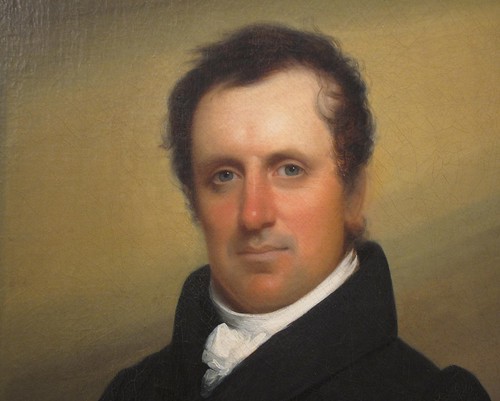by James Fenimore Cooper (6/8/12)
You simply can't discuss James Fenimore Cooper's The Last of the Mohicans without discussing Sir Walter Scott's The Waverley Novels.
The Last of the Mohicans is the second of a five-volume series called The Leatherstocking Tales. The Leatherstocking Tales stand in relation to The Waverley Novels as the Rolling Stones and the Beatles stand in relation to Elvis: One inspired and survived to maintain a presence during the ascendancy of the other. Here, Sir Walter Scott's The Waverley Novels were Elvis, and The Leatherstocking Tales are the Beatles.
The Waverley Novels are known as such because Sir Walter Scott wrote under a psuedonym- but Waverley was the first Novel in his series, and for the second book in the series it said that the Author was "The Author of Waverley;" referring to the TITLE of the first book. Unlike The Waverley novels, which were just a series of Novels by the same Author set in the past (i.e. "historical, epic fiction."), James Fenimore Cooper's The Leatherstocking Tales refer to a specific character, birth name, Natty Brumppo, although in the books he goes by a variety of names: the Pathfinder, the Trapper, Deer Slayer, Le Longue Carabine and, most hilariously, Hawkeye.
Similar to The Waverley Novels, The Last of the Mohicans is set in the past. Written in 1826, the events of The Last of the Mohicans re-enact well known "current events" from a half century ago. Like The Waverley Novels, The Last of the Mohicans and the other Leatherstocking Tales were not written in a political vacuum. To talk about Sir Walter Scott and his line of descent, as some kind of autonomous "Art for Art's Sake" type work is to entirely miss the main point of these books, which is to entertain, and convince the reader of a set of viewpoints that corresponds to the strongly held beliefs of the Author.
It may be a fascinating area of inquiry- parsing that out- but not really the concern of someone who is going to read The Last of the Mohicans because they saw the movie starring Daniel Day-Lewis or because, say, it's on the 1001 Books to Read Before You Die list. For those readers, The Last of the Mohicans is an inevitable disaster because of the clunk methods Cooper uses to go "back in time." All the dialogue is stilted, and the lavish depictions of scenery are hardly a revelation to anyone who has seen a photograph.
It's easy to understand WHY James Fenimore Cooper has been canonized, because he's the first internationally famous American Author, and because America INVENTED canonization in the mid 20th century, a time that was more concerned with American roots then we are today. However, the action doesn't hold the attention, and the politics are, to be kind, "politically incorrect." Another way to put it might be "well-meaning racism."

 Instagram
Instagram
No comments:
Post a Comment